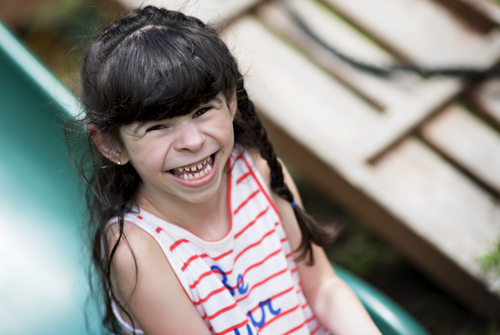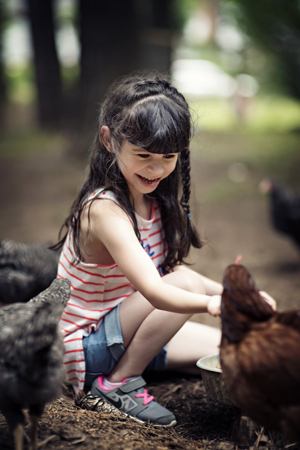A medical genetics journey
 Seven-year-old Layla Annabelle enters the CHKD auditorium, filled with 50 doctors-in-training, as a special guest speaker from the pediatric
medical genetics department. She flashes her contagious smile, waves her tiny hand at the crowd and announces, “Hello, all of you. I’m Layla. This is so amazing you’re all here!”
Seven-year-old Layla Annabelle enters the CHKD auditorium, filled with 50 doctors-in-training, as a special guest speaker from the pediatric
medical genetics department. She flashes her contagious smile, waves her tiny hand at the crowd and announces, “Hello, all of you. I’m Layla. This is so amazing you’re all here!”
Layla is a happy-go-lucky child who is extraordinarily outgoing. Her personality is one of the characteristics of Williams syndrome – a rare genetic disorder that is marked by medical issues, physical characteristics and, most noticeably, a joyful demeanor with essentially no social fear.
When Layla was born, doctors detected a heart murmur. Tests revealed she had supravalvular aortic stenosis, an obstruction of blood flow through the heart caused by narrowing of the large blood vessel that carries blood from the heart to the rest of the body. This discovery, along with some distinctive facial features, triggered a genetic test confirming that the 7-week-old had Williams syndrome. “My husband and I were in shock. We had never heard of Williams syndrome and had no idea what it would mean for our daughter’s future,” says Layla’s mom, Michelle.
Williams syndrome is rare, occurring in only 1 in 20,000 people. It is caused by the absence of roughly 25 genes on chromosome 7. This deletion appears to occur randomly with no known cause. And, although humans carry more than 20,000 genes, the loss of just 25 can have profound effects on an individual’s physical, behavioral and cognitive makeup.
The syndrome is characterized by a variety of medical problems, developmental delays, learning difficulties, small stature and distinctive facial features including a small turned-up nose, wide mouth, full lips and a small chin. But, it’s the strikingly social personality, gift for language and affinity for music that makes these patients truly unique.
“As fun-loving as Layla is now, it didn’t start out that way,” says Michelle. Infants with Williams syndrome often have digestive issues and extreme colic during the first year of life due to increased blood calcium levels, which can result in extended periods of crying and difficulty establishing sleeping patterns. “In addition to being a first-time mom of a child with a rare diagnosis, I was overwhelmed with a screaming infant who only slept 10 minutes at a time.”
When Layla was only a few months old, the family moved from their hometown in Connecticut to southeastern Virginia, where Layla’s father, Richard, was stationed with the Navy. Michelle and Richard were relieved to discover Layla could get all the care she needed at Children’s Hospital of The King’s Daughters, just an hour away from their new home. During her first visit with
Dr. Samantha Vergano, a pediatric medical geneticist at CHKD, Michelle immediately knew they were in the right place.
“Dr. Vergano was amazing and made us feel so confident in the quality of care we would receive from CHKD,” says Michelle. “She not only had experience with Williams syndrome, she quickly became a compassionate advocate for us. She coordinates all of Layla’s care, anticipating needs we may not even think of, and has connected us with wonderful
specialists all along the way.”
CHKD’s medical genetics and metabolism program plays an important role in the diagnosis, counseling and treatment of children with a wide range of genetic disorders, birth defects and developmental delays. The team is led by Dr. Vergano, who is board-certified in both pediatrics and medical genetics, and includes board-certified genetic counselors, a metabolic dietitian, nurses, an education consultant and a social worker, all of whom are trained to help children and families manage the needs associated with a wide variety of genetic diagnoses. It is the only clinic of its kind in southeastern Virginia.
“We develop an individualized treatment plan to meet the very unique needs of each child we treat - and their families,” says Dr. Vergano. “We also provide recommendations, referrals and coordination of care with the wide range of pediatric specialists and services each child may require.”
In addition to medical genetics, Layla’s CHKD care team includes specialists in
cardiology,
neurology,
audiology,
developmental pediatrics and
therapy services. By working together to ensure her physical, emotional and developmental health at an early age, they give Layla the best chance of reaching her full potential.
 “It’s been a pleasure to watch Layla grow and thrive over the years. Her cardiac issues are stable and, other than an early speech delay, she has hit every milestone within a normal range,” says Dr. Vergano. “Both Michelle and Layla have become an amazing resource for other Williams syndrome families as well as the doctors we train.”
“It’s been a pleasure to watch Layla grow and thrive over the years. Her cardiac issues are stable and, other than an early speech delay, she has hit every milestone within a normal range,” says Dr. Vergano. “Both Michelle and Layla have become an amazing resource for other Williams syndrome families as well as the doctors we train.”
Though Michelle’s life is now busier than ever, with a family that has grown to include three more children, three dogs and 22 chickens, she is happy to talk to anyone about the special challenges and gifts that come with Williams syndrome. “If someone is in a bad mood or having a bad day, Layla has a way of making them smile,” Michelle says. But Layla’s fearless social nature presents a special challenge. “She’s impulsive and can’t really understand the need for caution in many situations. So, it’s important that we are extremely vigilant in her supervision. She even has an aid in school to make sure there is an extra set of eyes on her.”
Though Layla may always need some extra support, with the continued efforts of her family, and her team at CHKD, her future is bright. Many children with Williams syndrome go on to college or to jobs in a variety of fields, often using their gifts for music, language and social interaction to bring joy to others.
“I do have worries about Layla’s future, but mostly I have a lot of hope,” says Michelle. “Having access to a great care team that really understands our needs is so important - for any parent of a child with special needs or health challenges. We’re so thankful for Dr. Vergano and CHKD. We couldn’t have ended up in a better place.”
This story was featured in the summer 2017 edition of Kidstuff magazine, a quarterly publication from CHKD that features inspiring stories about patients, physicians and friends of CHKD.